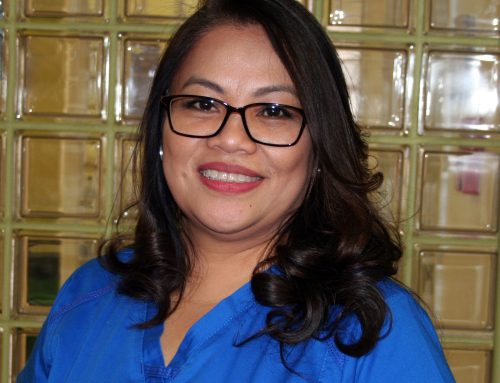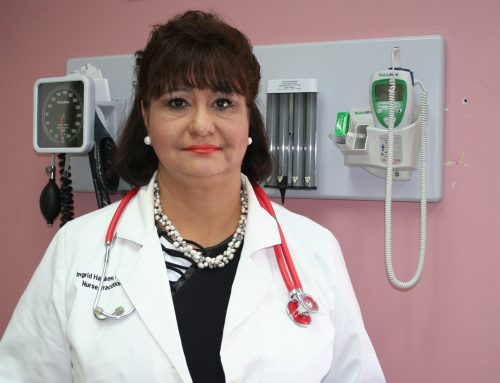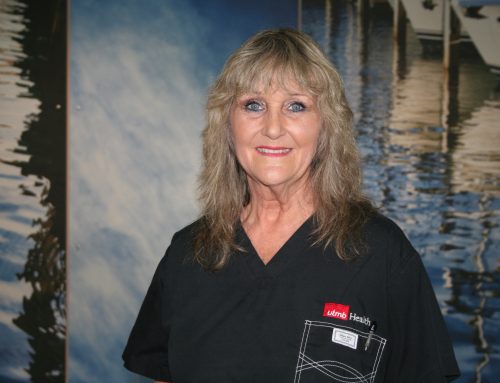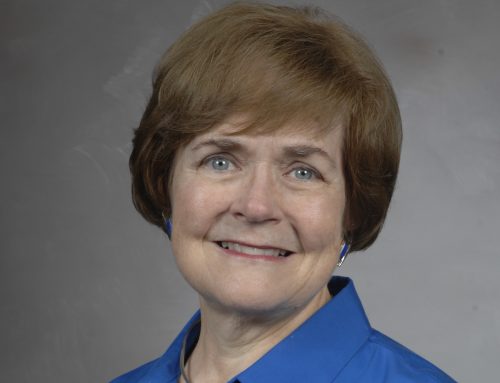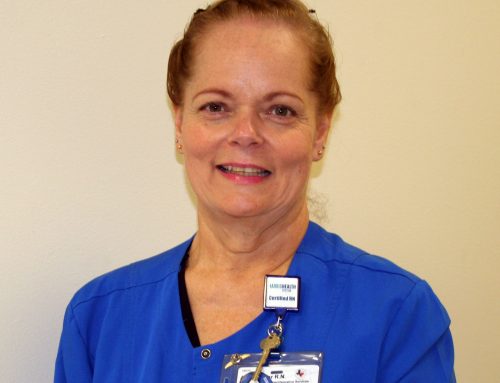2017 Gold Medalist – Clinical Practice in a Large Hospital
Rebecca Davidson, RN, The University of Texas Medical Branch at Galveston
“Advocate, compassionate, soulful. An angel in bright-colored tennis shoes. Integrity and sincerity for those she cares for and always including family members in her complete care.” Those are the words written by the sister of a former patient of Rebecca Davidson, who has practiced nursing for the past three years in the Neuro ICU at The University of Texas Medical Branch at Galveston. Rebecca was contacted last April by the Houston Chronicle and told that the sister had nominated her for the newspaper’s Top 10 Nurses award as part of its annual Salute to Nurses.
Rebecca came to nursing late, earning her associate’s degree after caring for her mother, who was diagnosed with cancer in 2009. “I took care of her from August to November, and while she was in hospice at my house, I found a passion. Because I grew up nursing my brothers and sisters and all the dogs, she’d always said I was a little nurse.”
After her mother passed, she went to nursing school at the age of 38, graduating in 2014. “What I love most about nursing and working in the Neuro ICU is that you meet your patients on their worst days, and as the days go by, you start to see them recover from strokes or traumatic brain injuries, begin to blossom, and progress through rehab,” she says. “Knowing you’re part of the team that’s there for them at the bedside is an awesome experience. Connecting with patients and their families during a long recovery is like having an extended family.”
Rebecca says she takes care of her patients the way she saw hospice nurses take care of her mother. “It was the most compassionate, loving care. They made my mom feel better even on her bad days. When I’m at work and walk up to the bedside and look at the family members, I know it’s the worst moment of their lives to have a loved one in that bed, not completely understanding what’s going on and not knowing what’s going to happen.”
Among those patients was the sister of the woman who nominated her for the Chronicle’s Top 10 Nurses. She wrote, “My sister arrived at UTMB having seizures and was admitted to the Neuro ICU. After her admission, we learned that she was much sicker than we thought. She had a stroke, was on a ventilator, and had vascular issues. We live in Port Arthur, and it took us some time to get to the hospital.
“We first encountered Rebecca early on in my sister’s hospitalization, and it was a comfort to meet someone who loved her job. Rebecca was so attentive to my sister and always encouraged us to be at her bedside talking to her. When we asked Rebecca questions, she always was honest no matter how difficult the answers were, but the way she showed sincerity in those answers gave us a peace and comfort knowing what was going on and what we could expect. My sister and I had been kind of estranged, and she wrote on the white board “sorry” and “love.” Those brought so much healing in a completely different sense than anyone but my sister and I could imagine.
“During the rough days ahead, Rebecca took on extra shifts to keep advocating, working with my sister, and being an angel when we couldn’t be at the bedside. When the time came and my sister’s body was giving up, Rebecca called and asked if we could come to the hospital. I asked if everything was okay, and she said, ‘It will be when you get here.’”
Rebecca describes her former patient as “the sweetest lady in the world” and says she cried when she got the letter from the Chronicle. “Her words were beautiful to me. I was honored to be seen in that light by a family member.”
She tells new nurses that success in nursing lies in treating people like family members. “Being an advocate for that patient is first and foremost the biggest, most compassionate thing you can do,” says Rebecca, who plans to get her BSN and MSN, with an eye toward teaching nursing. “As nurses, we turn doctors’ orders into real caring for our patients. You come to the bedside with a physician order, and it’s important to remember that you’re here for the patient. It’s the little things – your smile, your demeanor, praying with them if they ask – that mean the most. Nursing is not something you can clock into, go through the motions, and clock out. Your whole heart has to be in it.”
Her compassion doesn’t stop when she leaves the hospital. She has four rescued dogs, and in her spare time, she drives a food truck for stray dogs. “I have two boys, 19 and 21, and we load up the back of the truck and do food runs, looking for strays in parks and along the streets. When her sons are away at college, she loads up the trunk of her car and drives the city herself. “Dogs love you even when you’re at your worst,” she says. “They don’t have a voice, just like many of my patients don’t have a voice. It’s most important to give everyone a voice and make them feel safe.”
